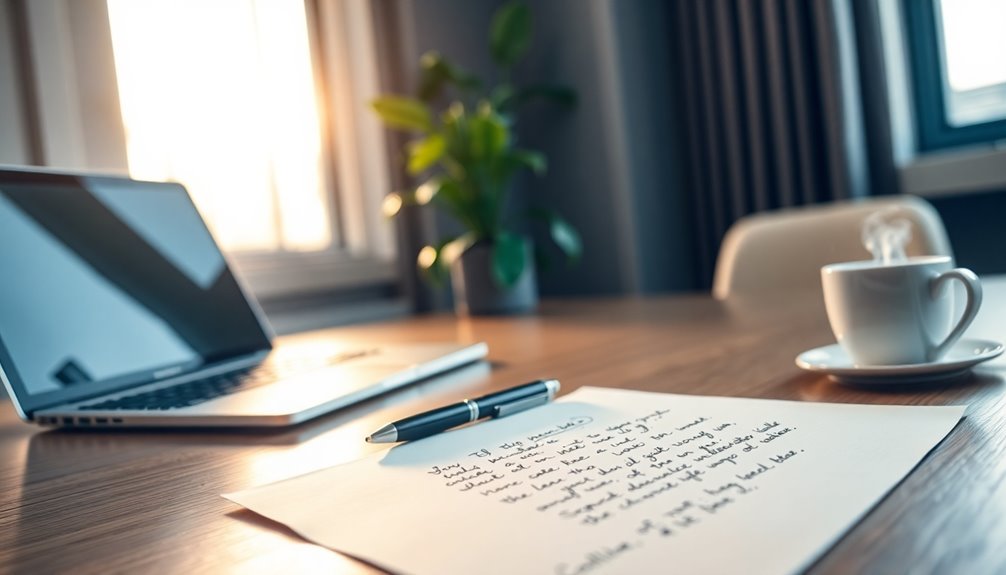The secret to making employers chase you lies in a personalized thank-you letter. Start with a warm greeting and express genuine gratitude for the opportunity. Highlight specific experiences or skills that relate to your conversation during the interview; this shows you’re thoughtful and engaged. Sending your letter within 24 hours keeps you fresh in their minds. Maintain a professional tone, and avoid generic language, as personalization makes a lasting impact. By reinforcing your enthusiasm and aligning your skills with the company’s goals, you create a strong connection. Stick around to uncover more tips for crafting an irresistible thank-you note! Most importantly, make sure to double-check for any spelling or grammar errors before sending your thank-you letter. Attention to detail can make a big difference. Lastly, consider sending effective thank you emails to multiple interviewers, if you met with more than one person. Tailoring each message to their individual contributions to the interview process shows that you were attentive and respectful of their time. Remember, a personalized thank-you letter can set you apart from the competition and leave a lasting impression on potential employers.
Key Takeaways
- Personalize each thank-you letter by mentioning specific conversations and shared interests to create a memorable impression.
- Highlight your unique qualifications and relevant experiences that align with the company's goals to showcase your fit for the role.
- Maintain a professional tone while expressing genuine gratitude, making your letter stand out among generic responses.
- Send your thank-you email within 24 hours to demonstrate enthusiasm and respect for the interviewer's time.
- Conclude with a strong call to action, reinforcing your interest in the position and eagerness to contribute to the team.
Importance of a Thank You Letter
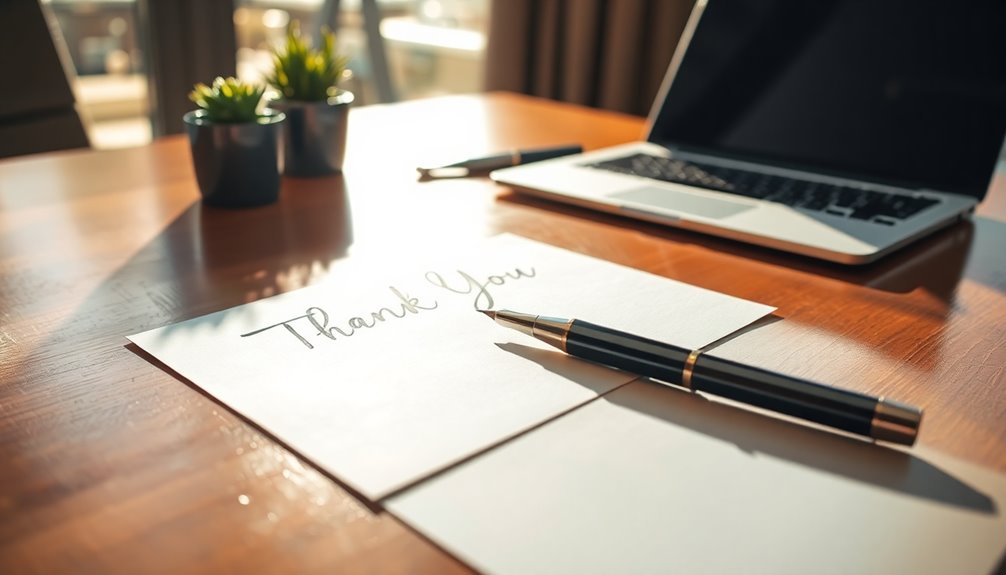
In today's competitive job market, sending a thank-you letter after an interview is more crucial than ever. It creates a positive connection with your interviewer, enhancing your image and leaving a lasting impression. By expressing your appreciation for their time and consideration, you demonstrate professionalism and courtesy—traits that employers highly value.
A well-crafted thank-you letter can greatly influence recruitment decisions. It reinforces your qualifications and reminds interviewers of your unique qualities and experiences discussed during the interview. This small gesture shows your enthusiasm for the role and the company, indicating that you're serious about the position and willing to follow up. Timeliness in sending your thank-you note further emphasizes your enthusiasm and respect for the interview process.
Moreover, sending this letter sets you apart from other candidates. It highlights your proactive nature, showing that you're engaged in the hiring process. Not only does this benefit you, but it also enhances the company's reputation.
When employers receive thank-you letters, it reflects a respectful approach to candidate management, contributing to a stronger employer brand.
Key Components to Include
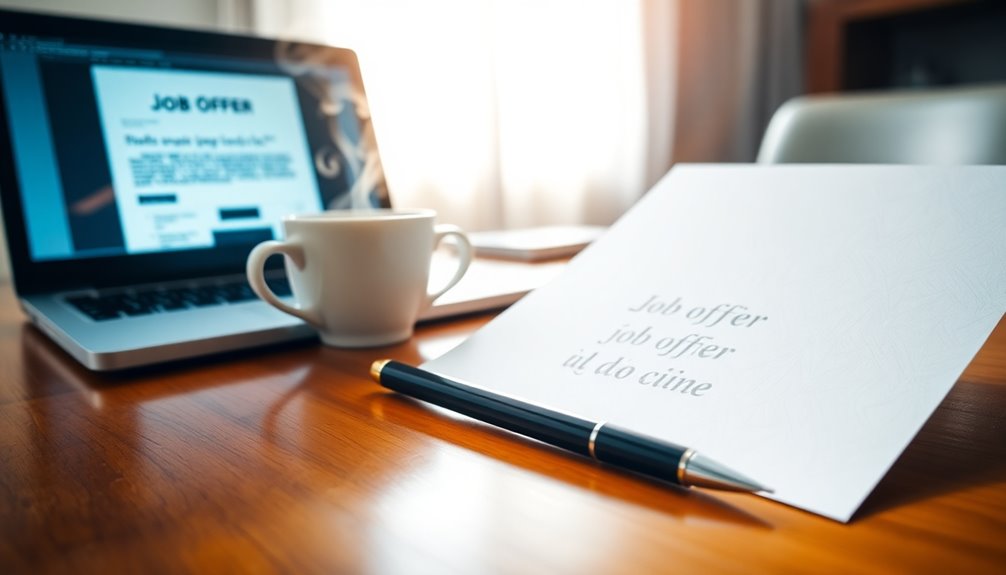
When crafting your thank you letter, maintaining a professional tone is essential, as it sets the right impression. You should also clarify any timelines related to future actions or meetings, ensuring everyone's on the same page. Finally, highlighting relevant skills or experiences can reinforce your appreciation and showcase how the recipient's contributions made an impact. Additionally, remember to include contact details to facilitate ongoing communication, especially if the recipient is a new acquaintance.
Professional Tone Matters
Crafting a thank you letter with a professional tone sets the stage for effective communication and leaves a lasting impression.
Begin with a concise subject line that includes the recipient's name and the purpose of your email. Use a professional salutation, addressing the recipient by their title and last name to personalize your greeting.
Next, clearly express your gratitude. Be specific about what you're thanking them for and use genuine, authentic language. Reference particular details or conversations to show you were engaged during your interaction, and convey your enthusiasm for the position or opportunity. Including keywords related to your skills can also reinforce your fit for the role.
In the body of the letter, keep your message brief and focused. Use clear, direct language that's easy to understand, and organize your thoughts to enhance readability. Highlight key takeaways or next steps to guarantee clarity. Additionally, remember to send notes promptly after interviews to reinforce your appreciation.
Finally, conclude with a professional closing statement that reiterates your gratitude. Use a formal sign-off, like "sincerely" or "my regards," and include your contact information.
Before sending, review your letter for any spelling, grammar, or syntax errors to maintain a polished, professional tone.
Timeline Clarity Essential
Understanding the timeline for sending thank you letters is vital for making a positive impression. Timing shows your appreciation and professionalism. Here's a quick reference for when to send those letters:
| Occasion | Recommended Timeline | Suggested Format |
|---|---|---|
| Holiday Gifts | Within 2 weeks | Handwritten Note |
| Job Interviews | Within 24 hours | Thank You Email |
| Graduation Gifts | Within 1 month | Handwritten Note or Email |
For each occasion, it's important to start with a heartfelt expression of gratitude. Explain how the gift or opportunity impacted you positively. Personalize your message by sharing a bit about yourself, such as your interests and achievements. This makes your appreciation resonate more. Additionally, remember that timeliness is essential when crafting your thank you notes, as it demonstrates your respect for the giver's kindness.
Don't forget to conclude by reiterating your thanks and highlighting how their support will influence your future goals. Remember, clarity and brevity are key. Proofread for any errors to guarantee your message comes across as sincere and polished. By following these timelines, you'll not only express gratitude but also leave a lasting impression that could make employers enthusiastic to connect with you!
Highlight Relevant Skills
Highlighting relevant skills in your thank you letter is essential for demonstrating your value and leaving a strong impression. You want employers to see exactly what you bring to the table. Here's how to do it effectively:
- Connect Skills to the Role: Reference the specific skills that align with the job you're applying for. If teamwork was a focus during your discussion, mention your collaborative projects and successes.
- Use Specific Examples: Illustrate your skills with concrete examples. If you discussed your problem-solving abilities, briefly recount a relevant challenge you faced and how you resolved it. Handwritten notes convey warmth and personalization, making your examples even more impactful. Additionally, showcasing your ability to diversify investments can indicate your strategic thinking and risk management skills.
- Show Enthusiasm for Growth: Express your desire to further develop these skills. If you spoke about your coding proficiency, mention your willingness to learn new programming languages or technologies relevant to the role.
Tips for Crafting an Effective Letter
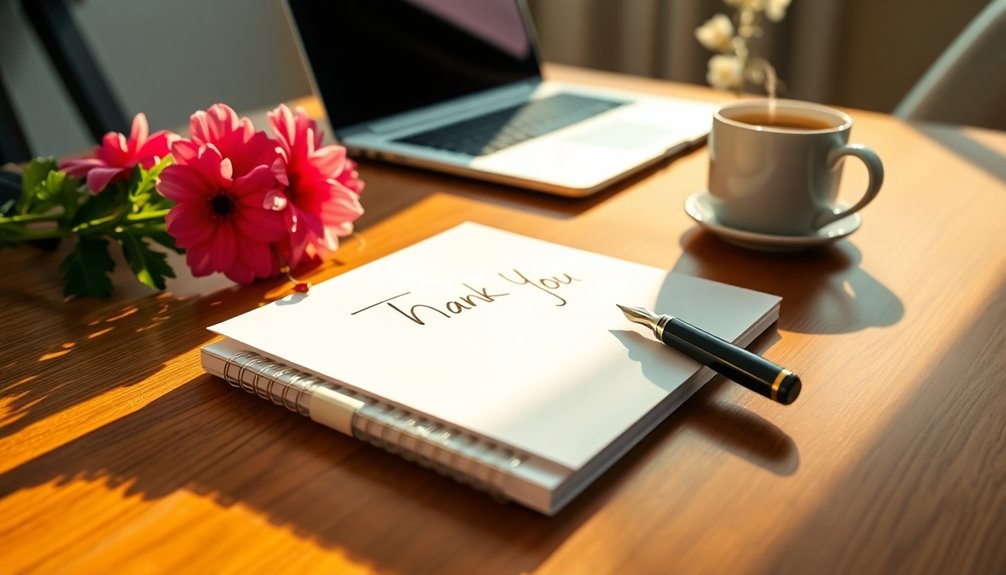
When it comes to writing a thank-you letter, knowing how to weave together appreciation and sincerity is crucial for making an impact.
Start with a proper salutation; use a formal address like "Dear Mr. Smith" for professional interactions or a first name for more casual ones. Avoid generic greetings to keep it personal.
Next, express your gratitude with specifics. Thank the recipient for their particular actions, mentioning projects or efforts that made a difference. Personalize your note by referencing past conversations or interactions, and highlight how their contributions have positively impacted the team or company. Employees desire recognition from managers, so acknowledging their efforts can significantly boost morale.
Include personal and relevant details to make your letter memorable. Share how their efforts resonated with you or contributed to future plans. Keep these insights brief yet meaningful to maintain the reader's interest.
Finally, close with additional thoughts and a polite signoff. Reiterate your thanks and acknowledge their role in the team's success. Use motivating phrases to encourage them, and choose a professional closing that matches the letter's tone, like "Sincerely" or "Best regards."
This structured approach will guarantee your thank-you letter leaves a lasting impression.
Common Mistakes to Avoid
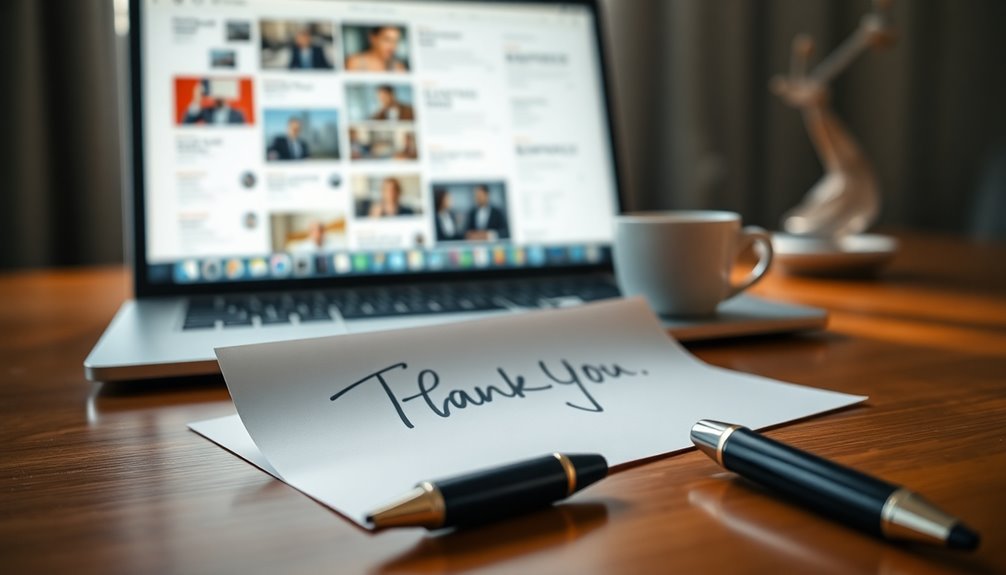
Crafting a thank-you letter is an opportunity to stand out, but common mistakes can undermine your efforts. To guarantee your letter shines, watch out for these pitfalls:
- Neglecting Personalization: Always address the recipient by name and reference specific details from your interview. A generic template won't cut it; you want your letter to feel personal and engaging. Personalizing letters fosters a stronger connection with the recipient.
- Lack of Timeliness: Aim to send your thank-you note within 24 hours. Delaying it can signal a lack of enthusiasm for the opportunity. Being prompt not only shows respect but also keeps you fresh in the employer's mind.
- Unprofessional Tone and Language: Aim for a balance in tone—professional yet warm. Avoid overly formal language or aggressive phrases that might come off as desperate. And don't forget to proofread for any spelling or grammatical errors!
Examples of Effective Thank You Letters

When crafting your thank you letters, personalization can make all the difference. By highlighting key skills and experiences that align with the recipient's interests, you show genuine appreciation and engagement. Including specific examples of past contributions can further enhance the impact of your message. Let's explore some effective examples that can guide you in writing impactful thank you notes.
Personalization Matters
Personalization plays an essential role in making your thank you letters stand out. When you take the time to tailor your message, it shows that you genuinely appreciate the recipient's efforts.
Here's how to personalize your thank you letters effectively:
- Customize the Greeting: Use the recipient's name and choose an appropriate salutation. A simple "Dear [Name]" can make a world of difference compared to a generic greeting.
- Express Specific Gratitude: Mention exactly what the recipient did and how it impacted you. Instead of just saying "Thanks for your help," specify, "Thanks for sharing your insights during our meeting; they clarified my project direction." This approach reflects the importance of expressing gratitude in your message.
- Add a Personal Touch: Recall a memorable moment you shared or mention a common interest. For example, "I enjoyed our discussion about sustainable practices and would love to explore that further."
Highlighting Key Skills
Effective thank you letters consistently highlight key skills that resonate with the recipient. Start with a warm salutation and express your gratitude for the opportunity to discuss the specific position. For example, "Thank you, [Recipient’s Name], for our conversation about the Marketing Manager role." This sets the stage for showcasing your relevant skills.
In the body, be specific about what you learned. Perhaps the recipient shared valuable insights about the company culture that align with your teamwork skills. Mention a project where you successfully led a team, demonstrating your ability to foster collaboration. Additionally, sending your note promptly will show your appreciation and demonstrate professionalism.
Link your skills to future contributions by discussing how you can help tackle challenges the company faces. For instance, if they mentioned a need for innovative marketing strategies, highlight your experience in developing campaigns that drove engagement.
Close with a strong call to action. Summarize your gratitude and reiterate how your skills align with their needs. Express your enthusiasm to stay in touch and include your contact information.
End on a professional note, reinforcing your excitement for the opportunity to contribute to their team.
How to Stand Out From Other Candidates
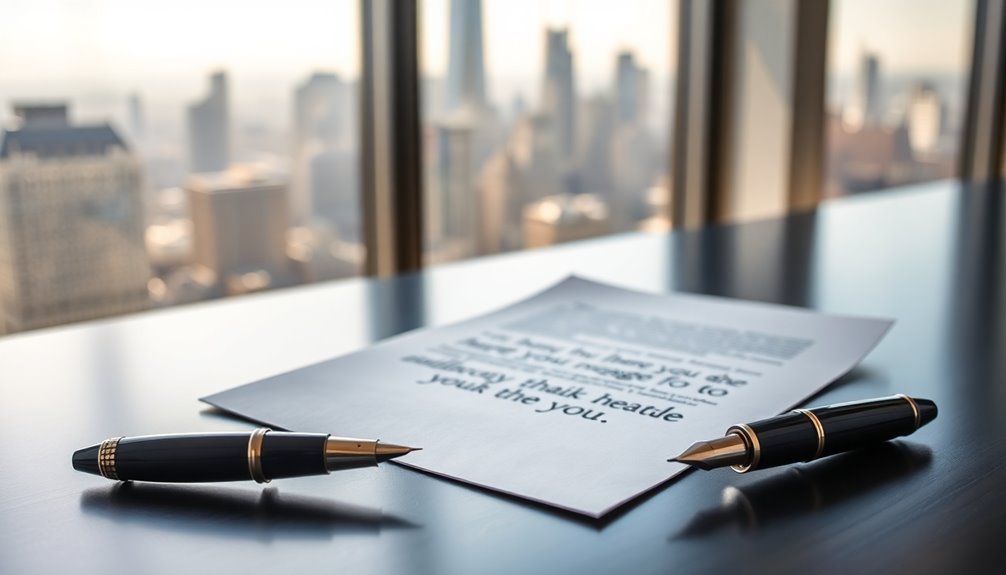
Standing out from other candidates requires a strategic approach that highlights your unique qualifications and genuine interest in the role.
A well-crafted thank-you letter can be your secret weapon. Here are three powerful ways to make it memorable:
- Personalization: Address each interviewer by name and incorporate specific details from your conversation. Mention something unique that resonated with you, showing that you were engaged and attentive.
- Clarity and Conciseness: Keep your message brief and to the point. Use clear language that's easy to understand. Aim for a format that's visually appealing, making it easier for the hiring manager to digest your key points quickly. A timely thank-you letter can also streamline communication, reducing candidate inquiries about application status.
- Gratitude and Enthusiasm: Start by thanking the recipient for their time, and reiterate your excitement about the position. Connect your skills to the company's goals and express how you can contribute to their success.
Frequently Asked Questions
Should I Send a Thank You Letter After Every Interview?
Absolutely, you should send a thank you letter after every interview. It shows your professionalism and enthusiasm for the role.
Aim to send it within 24 to 48 hours, recapping something memorable from your conversation. This personal touch keeps you fresh in the interviewer's mind and reinforces your interest in the position.
Tailoring each letter for different interview rounds can further enhance your chances of standing out in the hiring process.
Can I Email My Thank You Letter Instead of Mailing It?
Imagine waiting impatiently for your chance to impress, and then, just like that, it's over.
Can you email your thank-you letter instead of mailing it? Absolutely! Email's quick and convenient, letting your gratitude reach the interviewer within 24 to 48 hours.
Just guarantee it's professional, personalized, and error-free.
How Soon Should I Send the Thank You Letter?
You should send your thank you letter within 24 hours of your interview.
If the interview's on a Friday, try to send it the same day or early the following week. Acting quickly keeps you fresh in the interviewer's mind and shows your enthusiasm for the role.
Delaying beyond 48 hours isn't ideal but still acceptable.
Are There Any Specific Phrases to Avoid in a Thank You Letter?
When writing a thank you letter, steer clear of overly formal phrases like "I'm writing to you to say thank you" or "On behalf of the board."
Avoid jargon and corporate speak, focusing instead on a warm, sincere tone.
Don't emphasize your organization's goals; highlight the impact on individuals instead.
Finally, refrain from asking for anything in this letter—just express your genuine gratitude.
Keeping it simple and heartfelt makes all the difference.
What if I Don't Remember the Interviewer's Name?
If you find yourself in a bit of a pickle and can’t remember the interviewer’s name, don’t sweat it! Instead, a simple and effective way to handle this situation is to apologize and ask for the interviewer’s name again. Most interviewers will be understanding and appreciate your honesty. In fact, this small and common mistake can actually help you stand out as a candidate who is humble and willing to admit surprising hiring weaknesses. It’s all about how you handle the situation and move forward with grace and confidence.
You can still send a thoughtful thank-you note. Address it to the known interviewer and kindly ask them to share it with the rest of the team.
Express your gratitude, reference your conversation, and reiterate your interest in the role.
Keep it professional, concise, and let your enthusiasm shine through!
Conclusion
In the competitive job market, a well-crafted thank you letter is your secret weapon, a shining beacon that sets you apart. By expressing genuine gratitude and reinforcing your fit for the role, you'll not only leave a lasting impression but also keep the conversation alive. Remember, it's not just a letter; it's your opportunity to turn a moment into momentum. So, send that thank you, and watch employers come chasing after you!
